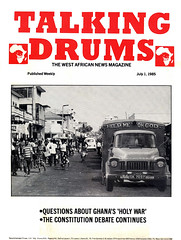Lest We Forget
Jakande alleges 'N145m deal
By Wole Odunaike
Daily TimesTHE INDEPENDENT NEWSPAPER 22,354.
SATURDAY DECEMBER 8, 1979 15K
Governor Lateef Jakande said that 24 hours to the exit of the military, a commissioner worked overtime to commit his administration to a "criminal expenditure" of N145 million.
Besides, he said, the commissioner signed 122 promissory notes to a bank over the deal.
The Governor was talking about the Lagos water supply scheme phases two and three, whose loan agreements were allegedly signed on September 27.
"To have committed an incoming government to an expenditure of this size, is to say the least, criminal. But it is worse than that.
"The then Commissioner for Finance obviously worked overtime on that eventful day. After signing those agreements, the gentleman sat himself down and proceeded to issue 122 promissory notes to one of the banks. "The notes were blank. The bank was expected to fill in the blank spaces whenever the notes were due to be presented".
SUSPICION As the hushed House of Assembly waited to be formally presented with the government's Supplementary Appropriation Bill, the Governor continued: "The (promissory) notes were not due to be presented until 35 months hence.
The question that no one could answer for me is "What was the hurry in despatching those notes when they were not due to be presented until three years later?"
Growls and hisses rang through the House as Governor Jakande added: "And as if this was not bad enough, the said commissioner proceeded the next day to order the Ministry of Works to start executing the contracts immediately".
He told the House that no provision was made for the repayment of the loan which was agreed to be at instalments of N30 million a year.
The Governor went on, "That is a very big slice of our scarce resources, and the acceptance of that suspicious commitment would have seriously jeopardised the implementation of the programme on which this government was elected.
"In this circumstance, I consider it my duty to save this state from this crippling financial burden. I have, therefore, cancelled all the contracts connected with this project. That cancellation is final and irreversible", he said.
The Nigerian-Biafran war
A documentary directed by Charles EnonchongNo single event in African history has elicited so much interest and emotion. The Nigerian Civil War, fought with great courage and brutality by the two sides would result in the death of over a million souls. For the first time in history, black African armies armed with modern weapons and commanded by black Africans were at war against each other. Many books have been written and many more will be written on the war. But, surprisingly, no non-propaganda film has been made with the Nigerian Civil War as its main topic.
Using newsreel footage, stills and docu-dramatic scenes directed by Charles Enonchong and shot on 35mm film, he has tried to recreate the military history of the war.
On January 15th, 1966, the Chief Instructor of Military Tactics at the MILITARY TRAINING ACADEMY KADUNA, Major Chukwuma Nzeogu, stormed into the residence of the Sardauna of Sokoto and killed him. OPERATION DAMISSA had begun. It would be followed 18 months later with the battles of Nsukka, then the capture of Enugu, the fall of Onitsha, Aba, Umuahia... How were these battles fought?
What part did Nigerian commanders Lt. Col Benjamin Adekunle, the Black Scorpion, Lt. Col. Murtala Mohammad, Col. Shuwa and Lt. Col. Obasanjo play? What of Biafran colonels Joe (Air Raid) Achuzie, the HANNIBAL OF BIAFRA, Onuatuegwu, Kalu and Brigadier Eze, whose 12th Division, won over to the non- violent faith of Jehovah's Witnesses in the Christmas of 1969, was the immediate cause of the capitulation of Biafra.
The battles and answers to the above questions make up the core of the "THE NIGERIAN-BIAFRAN WAR".
Mention is made of Brigadier Banjo and his attempt to overthrow Ojukwu, Colonel Steiner and his mercenaries who played a great part in the survival of Biafra..
In most of Africa, where corruption has merged and become part of custom and where human life is still precious, failure to show constraint in killing, even when it involves the shooting of a few corrupt bigwigs, can lead to some- thing infinitely worse than corruption itself. Something… like Civil War.
This is the most important message of this film.
